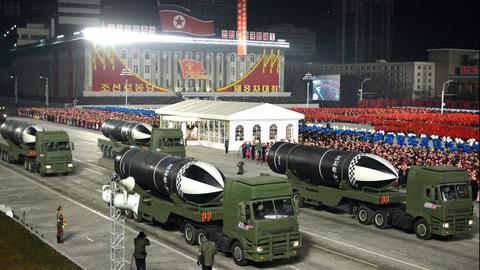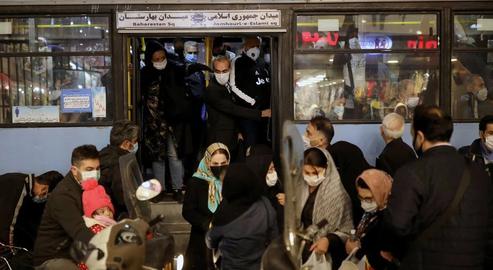Rafael Grossi, director-general of the International Atomic Energy Agency (IAEA), has now taken a clearer stance on the Islamic Republic's nuclear program and issued a rare warning against the Islamic Republic repeating the North Korean model.
Although Grossi said he had “no indication” Iran was currently trying to build a bomb, he added: “The case of the DPRK should remind us of what may happen if diplomatic efforts go wrong. It’s a clear example, it’s an indication, it’s a beacon. If diplomacy fails, you may be confronted with a situation that would have enormous political impact in the Middle East and beyond.”
The Islamic Republic’s nuclear program is the oldest dispute the IAEA has been involved with. It differs from that with North Korea, however, because Iran is officially still a member of the Nuclear Non-Proliferation Treaty (NPT). North Korea was a member of the IAEA for 20 years, but it never concluded bilateral agreements with the IAEA to oversee its nuclear program.
As such, when the IAEA’s 35-member board of governors declared this country non-compliant with its safeguarding agreements, the IAEA stopped most of its technical cooperation with North Korea. The latter then withdrew from the IAEA in June 1994. The Democratic People's Republic of Korea (DPRK) did, however, become a state party to the NPT in 1985.
With IAEA inspectors now locked out of monitoring nuclear facilities, the DPRK came under international pressure to rejoin. Because the country refused to engage directly with the US, the Group-6 – not dissimilar to the P5+1 and comprising Russia, the US, China, Japan, South Korea and North Korea – was formed with the aim of coming to an agreement and ensuring the DPRK’s nuclear program remained peaceful.
In October 2002, while those talks were still ongoing, the US announced that North Korea had secretly initiated a plan to build a nuclear weapon, demanding that it scrap its production infrastructure and cooperate fully with the international community. The DPRK, meanwhile, held that it was its inalienable right to develop a defense program against China, the US and South Korea.
As clashes continued, the US threatened North Korea with an oil embargo and cutting off financial aid; North Korea in return accused the US of failing to meet its bilateral commitments. Less than three months later in January 2003, the DPRK informed the UN Security Council that it was withdrawing from the NPT.
The withdrawal took place three months later. It was then that George W. Bush, then-President of the United States, called North Korea part of the “axis of evil” along with Iraq and the Islamic Republic of Iran the "axis of evil" shortly before invading Iraq, officially to disrupt Saddam Hussein's nuclear program. North Korea had conducted a nuclear test in the spring of 2003 despite this, formally entering the club of states known to have nuclear armaments. The country has continued to build its arsenal, without any IAEA oversight, ever since then despite international sanctions.
The Islamic Republic, meanwhile, has since echoed North Korea’s argument, accusing the US of breaching its international obligations after Donald Trump withdrew from the JCPOA and reimposed sanctions. But for the past two years Iran has also fulfilled its obligations to the IAEA in an incomplete manner, not dissimilarly to the period after North Korea had withdrew from the IAEA, but while it was still a member of the NPT.
Now, Iran’s uranium enrichment machine parts manufacturing complex in Karaj is operating without IAEA oversight. Grossi has no direct contact with members of the Ebrahim Raisi administration, but the president of Iran has written a letter to the IAEA board’s member states warning that if UN Security Council sanctions are reinstated as a consequence, Iran will withdraw from the NPT just as North Korea did in 2003.
There is a chance that officials in the Islamic Republic will regard North Korea as a model for how to go about acquiring ballistic missile technology. The Islamic Republic’s current, strange approach to renewed JCPOA talks only reinforces this suspicion.
Related coverage:
The IAEA Nuclear Impasse: Five Questions Tehran Needs to Answer
IAEA Accuses Iran of Stonewalling its Investigations
Nuclear Acceleration and Rocket Attacks: The Uncertain Future of the JCPOA
Uncertain Future for Nuclear Deal as Rouhani’s Presidency Comes to an End
What Do We Know About the Nuclear Watchdog’s Cameras in Iran?
US Envoy for Iran: Tehran May Never Come Back to the JCPOA
What Will 60 Percent Nuclear Enrichment Do to Iran’s Future?
Zarif's Book, Part IV: The Behind-Closed-Doors Nuclear Shouting Match
Zarif's Book, Part III: Mohsen Fakhrizadeh's Role in the Nuclear Talks Revealed
visit the accountability section
In this section of Iran Wire, you can contact the officials and launch your campaign for various problems

























comments